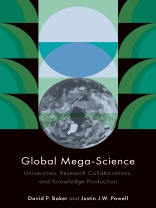Never has the world been as rich in scientific knowledge as it is today. But what are its main sources? In accessible and engaging fashion, Global Mega-Science examines the origins of this unprecedented growth of knowledge production over the past hundred and twenty years. David P. Baker and Justin J.W. Powell integrate sociological and historical approaches with unique scientometric data to argue that at the heart of this phenomenon is the unparalleled cultural success of universities and their connection to science: the university-science model. Considering why science is so deeply linked to (higher) educational development, the authors analyze the accumulation of capacity to produce research—and demonstrate how the university facilitates the emerging knowledge society.
The age of global mega-science was built on the symbiotic relationship between higher education and science, especially the worldwide research collaborations among networked university-based scientists. These relationships are key for scholars and citizens to understand the past, future, and sustainability of science.
O autorze
David P. Baker is Professor of Sociology, Education, and Demography at Pennsylvania State University and the 2023-24 George Sarton Chair for the History of Science at Ghent University, Belgium. He is the author of
The Schooled Society (Stanford, 2014) and co-author of
National Differences, Global Similarities (Stanford, 2005) and
The Century of Science (2017).
Justin J.W. Powell is Professor of Sociology of Education at the University of Luxembourg. His (co-)authored books include
Comparing Special Education (Stanford, 2011),
Barriers to Inclusion (2016), and
The Century of Science (2017).












